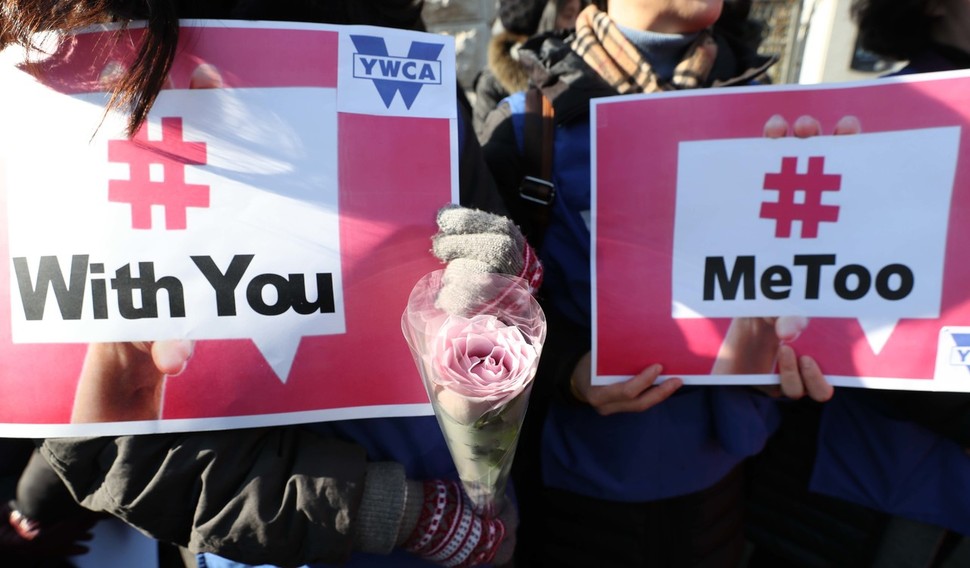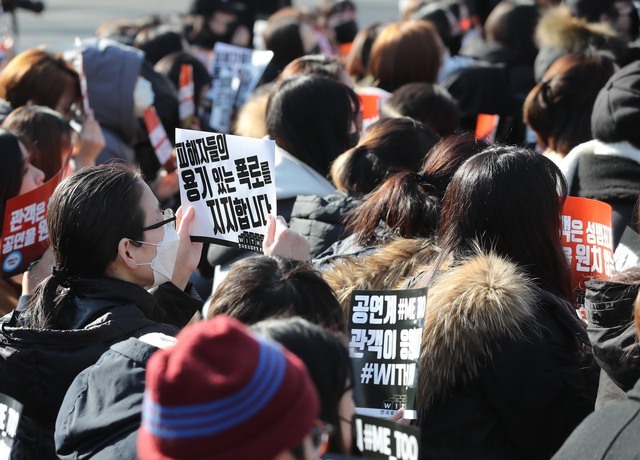 |
|
A woman holds a white rose between two signs during a MeToo demonstration in front of the Supreme Prosecutors’ Office in the Seocho district of Seoul on Feb. 1. The white rose is the symbol of the MeToo movement. (by Baek So-ah, staff photographer)
|
Outpouring of support for Seo Ji-hyeon and other victims of sexual harassment and abuse continues to grow
A torrent of “MeToo” accusations is causing deep fissures in some of South Korea’s more regressive cultural practices as it spread from the prosecutors to the culture and arts, academic, press, religious, and business communities. Meanwhile, the outpouring of “With You” messages expressing support for “MeToo” and denouncing the barbaric reality of sexual assault continues to grow. A month into the MeToo movement, many are now saying South Korea is being swept into a wave of major changes that will leave it permanently transformed. The South Korean MeToo movement began with courageous revelations of sexual harassment by Seo Ji-hyeon, a prosecutor in the Tongyeong branch of Changwon District Prosecutors’ Office. On Jan. 29, Seo posted a message on the prosecutors’ ePROS electronic knowledge management system alleging sexual harassment by former bureau director Ahn Tae-geun. Her revelations – which showed that even the prosecutors charged with defending the law and justice were not free from an internal culture of sexual assault – sent shock waves through South Korean society. Having started in the legal world, the MeToo movement soon spread to the culture and arts community with allegations of habitual sexual assault by Yeonhee Street Theatre Troupe artistic director and theater world doyen Lee Youn-taek. The culture of abusing internal authority to perpetrate sexual assault turned out to be deeply rooted and far-reaching. Soon, noted entertainers, including actors Jo Min-ki and Cho Jae-hyun, were also being implicated in accusations of sexual misconduct, and with allegations of sexual assault by Catholic priests, South Korea’s deeply rooted hierarchical structures and cultural sexism were being drawn into the daylight. Today, MeToo has become more than just a movement demanding that its victims accept the risks – it is now a cultural undercurrent transforming practices throughout South Korean society. Some experts have even begun saying the history of South Korean society can divided into two periods: before MeToo and after. In the past, many women alleging sexual victimization were treated as “heretics” threatening organizational order or scorned as “gold diggers.” They often found themselves facing counterattacks of false accusations and defamation. But with Seo’s revelations sparking a growing belief that change is possible, women who felt unable to speak out about their victimization in the past are now coming forward. The difference is that many now feel they can actually realize changes. “Habit may well set in again some time, but the most crucial difference now is the awareness that things can change if you speak out,” said Kim Ji-hyeon, director of the Goyang Sexual Assault Counseling Center.
 |
|
Citizens voice support for women who suffered sexual abuse and harassment in the South Korean theatre community during a MeToo demonstration held at Marronnier Park in the Jongno district of Seoul on Feb. 25. (by Baek So-ah, staff photographer)
|







